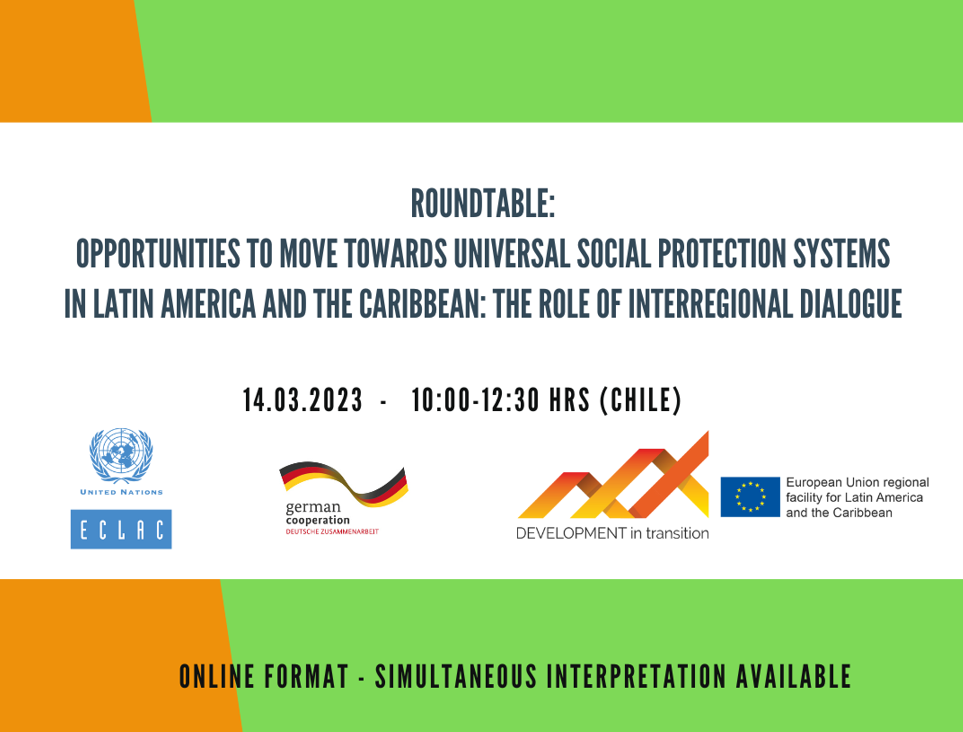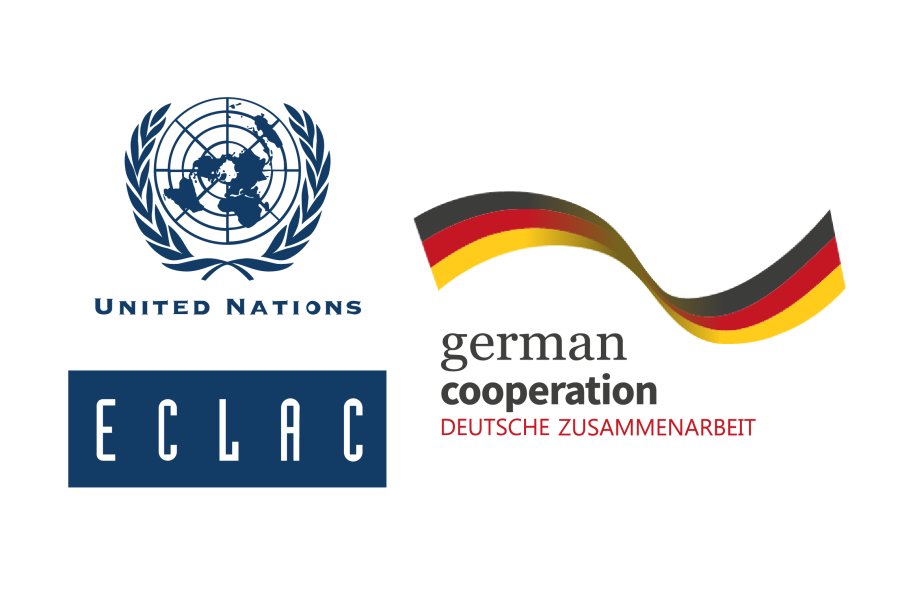Roundtable "Opportunities to move towards universal social protection systems in Latin America and the Caribbean: the role of interregional dialogue"
Work area(s)
Teaser
This online event is organized under the framework of two projects: “Social protection and vulnerability: universal social protection systems in Latin America” of the Facility for Development in Transition, financed by the European Union, and the ECLAC-BMZ/giz project “Transformative Reactivation: Overcoming the consequences of COVID-19 pandemic in Latin America and the Caribbean”. This event also contributes to the preparative works of the Regional Conference on Social Development in Latin America and the Caribbean to be held next October. Simultaneous interpretation spanish-english-spanish will be available.
Background
Social protection systems have played a key role in mitigating the unprecedented health, economic and social impacts of the COVID-19 pandemic. The rapid reaction and implementation of an unparalleled number of emergency non-contributory social protection measures to ensure a level of consumption and welfare for the most vulnerable households in the region demonstrate this. Between March 2020 and August 2022, 506 measures were announced during the period by 33 countries in the region. The expansion or implementation of preexistent and new measures has made it possible to achieve a quite high coverage of the population which, due to the active search for potential recipients, incorporates populations previously invisible in social information registries, such as informal workers, migrants, and young people, among others.
The trajectory of these measures has been diverse, and while some have come close to a basic emergency income, in other cases they have been one-off, short-term measures. It is worth mentioning that some of these measures remain in place to date despite the improvement in the epidemiological indicators of the pandemic and are increasingly being considered as part of countries’ social protection matrixes and in response to rising food prices and inflation.
The rapid and effective adoption of cash and in-kind transfers, as well as the increase in the amounts and coverage of existing transfers, played a key role in mitigating further increases in poverty. Furthermore, these have contributed to the debate on the possibility of deploying income guarantees as a permanent policy of universal social protection systems, also highlighting the debate on a universal basic income. Although the proposal comes from previous decades, the context of the COVID-19 pandemic renews its discussion in view of the need for instruments that contain the impacts of crises and permanently ensure income and the wellbeing of people regardless of their socioeconomic situation and stage in the life cycle. This debate coexists with other options that may also be implemented to protect income levels on a temporary basis, such as in the face of crises, or permanently. Taken together, these options imply a radical change in the region’s predominant welfare regimes, moving away from targeted mechanisms towards universality and sufficiency, and taking into account the financial sustainability of the social protection systems. They also imply facing the structural challenges- of inequality, vulnerability, and informality – and emerging challenges, associated, among others, with major technological, labour market and demographic transformations as well as the climate emergency.
While the crisis generated by the COVID-19 pandemic revealed the structural weaknesses faced by social protection systems and their challenges in terms of functioning and coverage, it also opened opportunities to rethink social protection systems and consider income protection instruments. This is particularly important at a time of overlapping crises, including an unstable global context and the increase in food prices, and the need for pre-established instruments to deal with emergencies, crises, and disasters. It is therefore urgent to consolidate universal, comprehensive, sustainable, and resilient social protection systems from a rights, gender, and life-cycle perspective. These social protection systems must be consolidated in such a way as to not only eradicate poverty but also to decisively reduce inequalities and guarantee the exercise of people’s social rights, as a basis for the construction of a new social, fiscal, and intergenerational pact in the region.
Among other dimensions, this implies deepening the discussion on the lessons learned from the social protection measures adopted to face the pandemic, analyzing the feasibility of options to universalize social protection systems, and assessing instruments to guarantee adequate income levels in the face of multiple crises and on a permanent basis. In a context of a risk structure in process of change, it is also essential to strengthen the link between contributory and non-contributory social protection policies, and between social protection, sectoral policies and labour inclusion policies. This will make it possible to move towards sustainable development with equality and towards fully democratic societies, with higher levels of social cohesion and stability to face the challenges of the current context.
The role of cooperation and dialogue between the countries of Latin America and the Caribbean, and Europe is key to making progress in the implementation of good practices towards building universal, comprehensive, and sustainable social protection systems, making it possible to identify common challenges in this area based on evidence and to promote the social, economic, and political viability of the necessary reforms within the framework of a Welfare state.
Objectives
This event is organized under the framework of two projects: “Social protection and vulnerability: universal social protection systems in Latin America” of the Facility for Development in Transition, financed by the European Union, and the ECLAC-BMZ/giz project “Transformative Reactivation: Overcoming the consequences of COVID-19 pandemic in Latin America and the Caribbean”. This event also contributes to the preparative works of the Regional Conference on Social Development in Latin America and the Caribbean.
The main objectives of the event are:
-
To promote a suitable space to present the main findings of the research and the documents generated in the framework of the projects aimed at strengthening universal social protection systems in the face of crisis within the framework of a welfare state
-
To generate an enabling environment for the exchange of experiences, instruments, and perspectives on social protection and to discuss innovative proposals for the construction of universal systems and instruments aimed at guaranteeing income levels.
-
To foster inter-regional dialogue, in particular between Latin American, Caribbean and European countries, on the lessons learned to face the challenges and harness the opportunities to advance towards universal social protection systems
Methodology
The session will take the form of a roundtable discussion on the challenges to advance towards universal and sustainable social protection systems, and the construction of key instruments to achieve this objective, based on the findings of the documents generated in the framework of the projects. This will be followed by comments from specialists based on comparative research in Latin America, the Caribbean and Europe on these issues. This session will be open to the external public and simultaneous interpretation spanish-english-spanish will be available.
Programme of work
Opening Session
Alberto Arenas de Mesa, Director of the Social Development Division, ECLAC
Olga Baus Gibert, Deputy Head of Unit DG INTPA B2 - Central America and the Caribbean, European Commission
Thomas Schmitt, Deputy Head of Mission, Head of the Economic and Cooperation Section, German Embassy in Chile
Roundtable: Lessons and opportunities for social protection in the face of the pandemic and emerging crisis: how to move towards a social and fiscal compact for universal social protection?
Moderator: Rodrigo Martínez, Senior Social Affairs Officer, Social Development Division, ECLAC
Introductory presentation:
“Deficits and opportunities for strengthening social protection systems and income protection in the face of crises in Latin America and the Caribbean”
Claudia Robles, Social Affairs Officer, Social Development Division, ECLAC
Raquel Santos Garcia, Associate Social Affairs Officer, Social Development Division, ECLAC (20min)
Roundtable:
“Central elements of the comparative experience in universal social protection systems: strategic orientations”
Juliana Martínez Franzoni, Researcher at the University of Costa Rica (15min)
“Instruments to deepen the links between social protection and the reduction of informality”
Sebastián Nieto Parra, Head of Latin America and the Caribbean, OECD Development Centre (15min)
“Lessons and challenges for social protection and inclusion policies in response to the COVID-19 crisis: analysis of the response to the pandemic crisis in 35 European countries”
Slavina Spasova, European Social Observatory and Free University of Brussels (15min)
“Future challenges for social protection systems: lessons learned from the interregional experience”
Markus Loewe, Senior Researcher, German Institute of Development and Sustainability (IDOS) (15 min)
Presentation(s)
Questions and answers
Closing of the day

